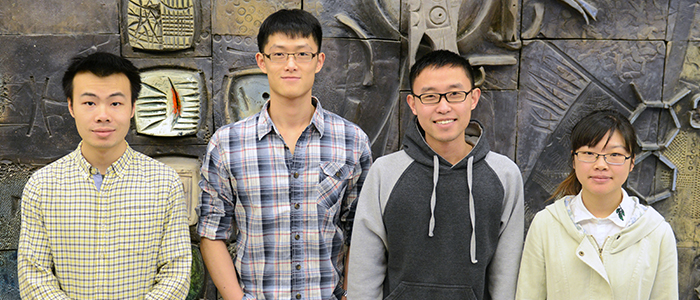The international advantage

When Florence Deng hit the halfway point of her medical school training in China last year, she became restless and wanted a change of pace.
Ready to experience something new and exciting, Deng applied for the China Scholarship Council (CSC) program — an agreement that would give her the opportunity to spend one year training in a research environment at the Schulich School of Medicine & Dentistry.
She began the program in August 2015 along with Xiaojing Gu, Shuxin Zhang, Jiarong Wang and Yujun Zeng, four other medical students from China.
“I’m currently learning all about scientific research — trying to understand what it is, and learning how to do it well and how to keep an open mind,” Deng said. “The experiences I have had so far have provided me with a better understanding of medicine in a scientific way, instead of only in a clinical way.”
While Deng is working with her supervisor Hon Leong, PhD, on establishing a new prostate cancer screening platform, the other students funding by the CSC agreement are working on a variety of other projects in the fields of anatomy and cell biology, microbiology and immunology, physiology and pharmacology, and medicine.
Gu enjoys the time she spends working in the lab, as it is much different from learning in the classroom where there are often right and wrong answers.
“When I was learning in the classroom of taking exams, the answers were always clear,” Gu explained. “But when I do an experiment here, I never know what the results will be before I finish it, and my supervisor doesn’t tell me what is right because we’re exploring the potential answers.”
“The students I have supervised have made positive contributions to my lab — they are highly motivated, fluent in English and eager to learn” — Terry Peters, PhD
The majority of the skills the international students will gain from the one-year term are related to research, but training in Canada is also a great way for them to become more comfortable speaking and writing in English.
Zeng explained it is one thing to pass English exams in China, but another to use it on a daily basis — a necessity that has made him more familiar with the language.
The CSC agreement not only benefits international students by providing them with hands-on research training, but also benefits the School’s faculty members, trainees and labs.
Terry Peters, PhD, is now in his second year of supervising students funded by the CSC agreement. A professor in the Departments of Medical Imaging, Medical Biophysics and Biomedical Engineering, and a scientist at Robarts Research Institute, Peters has had a very positive experience with the program and thinks it will lead to greater mutual understanding between institutions and cultures, and ultimately promote collaboration on a global scale.
“The CSC program creates awareness of Western University in general, and Schulich Medicine & Dentistry in particular, amongst targeted Chinese institutions,” Peters explained. “The students I have supervised have made positive contributions to my lab — they are highly motivated, fluent in English and eager to learn.”
Deng encourages other Chinese students to take advantage of this agreement for both professional and personal reasons, such as seeing what is happening in the western world.
“The brand new environment has refreshed my mind and provided me with many choices that have helped me better understand myself,” Deng said. “There are a lot of things to learn in Canada and at Western University, and you can largely improve yourself here in an academic and social way.”








